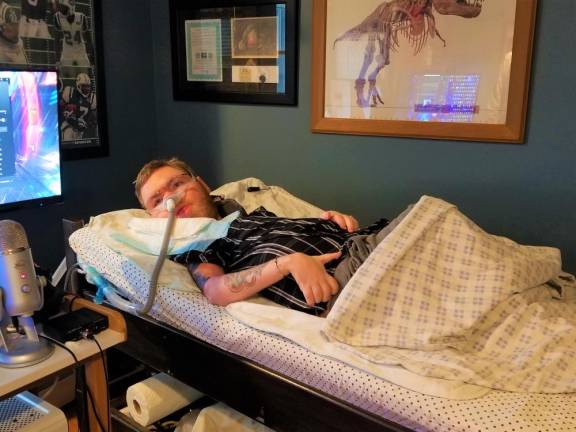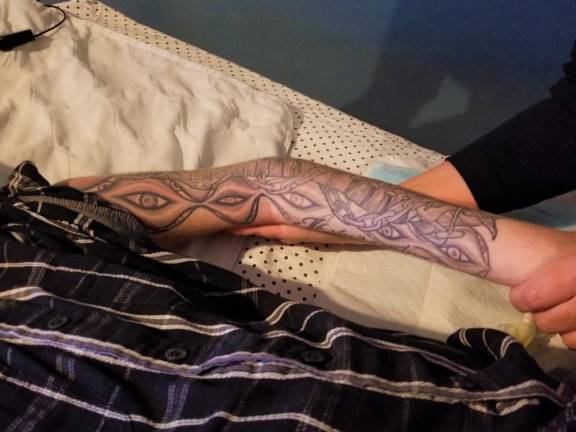Local man’s gene therapy attempt featured in Netflix docuseries
WARWICK. Nicholas Piazza’s attempted use of gene therapy to treat his Spinal Muscular Atrophy is featured in the Netflix docuseries 'Unnatural Selection.'
“We’re very excited to see it,” Manny Piazza said with a laugh. “We don’t even remember what we said!”
“It” is the second episode of the Netflix docuseries “Unnatural Selection,” which premieres on Oct. 18, and profiles the people behind the burgeoning science of genetic manipulation.
Manny and his wife, Kathleen, are looking forward to seeing the episode for a very personal reason: their oldest son Nicholas is featured in it.
Now 26, Nicholas was diagnosed with Type 1 Spinal Muscular Atrophy (SMA) when he was just 6 months old, and is one of the oldest surviving patients with the diagnosis, his parents said.
“Netflix wanted to follow someone on this (treatment) journey, from beginning to end,” Kathleen said. “Fighting with the insurance company, etc.”
According to the National Organization for Rare Disorders, SMA is a group of inherited genetic disorders characterized by the loss of certain nerve cells in the spinal cord called motor neurons.
Motor neurons receive the nerve impulses transmitted from the brain to the spinal cord, and, in turn, transmit the impulses to the muscles.
The loss of motor neurons leads to progressive muscle weakness and muscle wasting in muscles closest to the trunk of the body, such as the shoulders, hips and back. These muscles are necessary for crawling, walking, sitting up and head control.
“If you can imagine his body is an electrical grid, he has about 90 percent less of what we have in our bodies,” Manny said.
Lying on his bed, covered by blankets and surrounded by framed sports and historical memorabilia, Nicholas cannot sit up or walk on his own. A nursing aide waits nearby, and what appears to be a sophisticated computer set-up inhabits an adjacent cart.
The hardest part, Nicholas said, is feeling trapped in his own body, because his mind isn’t affected the way his body is. People often mistakenly assume he is developmentally disabled, because of his physical limitations.
“It’s extremely frustrating,” he said, speaking with some difficulty.
Hope for a cure appeared on the horizon in 2017, in the form of the drug Spinraza.
Given by injection, Spinraza is the first FDA-approved drug to treat children and adults with SMA. It works by increasing the body’s production of survival motor neuron protein, which addresses an underlying cause of the condition, according to manufacturer Biogen.
More than 2,600 individuals have been treated with Spinraza nationwide, according to the company.
Nicholas said he received three injections before he had an adverse reaction to the drug and decided to stop the therapy.
“For me, it was frustrating because, here I am, finally with some hope of a cure, and then I can’t do it anymore,” he said.
Following his reaction, Kathleen said it took several months for Nicholas to get back to his version of normal.
Though his life is not easy, requiring assistance at every turn, Nicholas doesn’t see the sense in a glass-half-empty mentality.
“It’s nice to know that I might be the last,” he said. “That I might be the last generation to deal with this. That’s kind of comforting in a way.”
Kathleen and Manny both said that there are other SMA treatments coming out, including an oral version of Spinraza, that could potentially work.
“I always said I’ll try anything,” Nicholas said. “Anything until something works.”
The Piazzas said they hope other families in similar situations will see their story in the Netflix episode and come away with a renewed sense of hope.
“Just to see that you have to always have hope,” Kathleen said. “You never know what’s coming down the road.”
Manny said he hopes that the Netflix docuseries will inspire people to be more compassionate when they encounter people like Nicholas.
“We just want people to know, if you see someone like him, go talk to him, take some time and say hello,” he said. “Don’t treat him like a freak, because, you know, it’s unfortunate, but people like him are discriminated against a lot.”
From finding a curb cut-out for Nicholas’ wheelchair when they go out, to looking for an accessible way in, Manny said they have to consider everyday things in a way most people don’t have to.
“When we go into a restaurant with him, we’re going in the back entrance, sometimes through a kitchen – that’s the way it is with us,” he said. “The separation that we go through is incredible.”
Still, the Piazzas said the most important thing is taking it one day at a time.
“It’s going to happen sooner or later,” Manny said. “They’re going to fix the nerve cells too, that’s coming.”
“It’s nice to know that I might be the last. That I might be the last generation to deal with this. That’s kind of comforting in a way.”
- Nicholas Piazza

